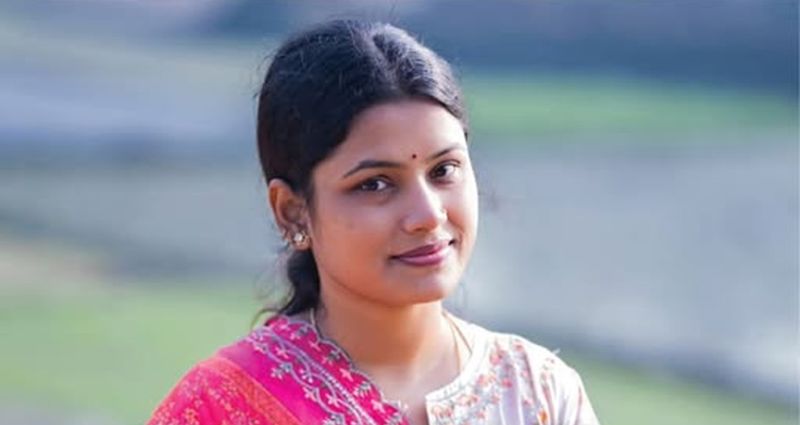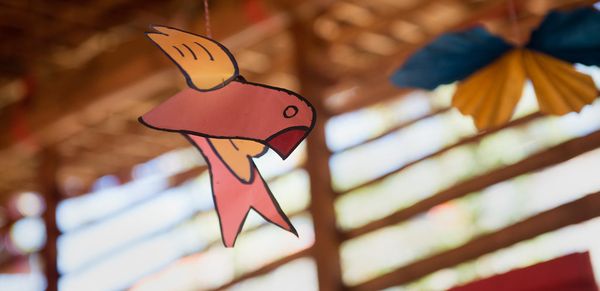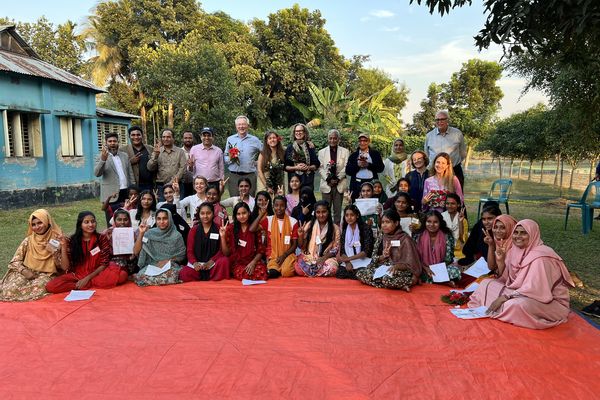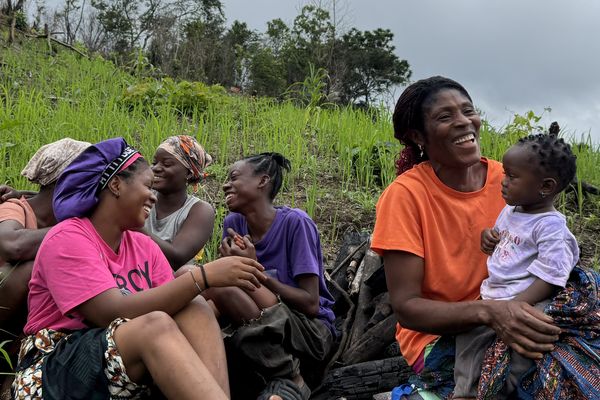The interview was originally written by Pintu Ranjan Arko in Kaler Kantho. To read the original article in Bengali click here.
“Endure in silence, oyster.
Persist in silence, oyster.
Though poison fills your depths below,
Speak no word, let your pearls grow!”
Maly Kiriti was silently enduring everything like the little oyster in Abul Hasan’s poem ‘ঝিনুক নীরবে সহো’ (‘Endure in silence, oyster’). Demotivated, she questioned the purpose of her life and quietly closed the doors. But one look at her son’s face stopped her from giving in to despair and made her hold on.
“I am a mother!” she exclaims as she endures the silent pain—seeing her life reduced to ashes.
However, after travelling through long, dark paths, she has finally seen light at the end of the tunnel. Today, a new chapter began in Maly’s life as she starts her professional career as an Accounts Officer at BRAC.
Before the storm
Born in Ghatail, Tangail, central Bangladesh, Maly is the eldest of three siblings. Her father was a tailor at a shop.
Mahadev, Maly’s father, was struggling to support his family of six. He mortgaged his land to go to Yemen for work. Even there, life was hard—earning a living proved difficult itself, and sending money back home was out of the question. Maly’s mother learnt to sew shirts, blouses, and kanthas (quilts) to help her father support the family.
Maly always excelled in her studies. She passed Grade 10 with a Grade Point Average (GPA) of 4.88 (out of 5) and was later admitted to Pakutia Public School and College.
Maly was a top—performing student who was never placed second in high school. She dreamed of pursuing her higher education in science. However, due to the high costs associated with it, she enrolled in the business department instead. Even then, she paid for her tuition by tutoring other students.
2013 – Silenced dreams
As soon as Maly entered Grade 9, marriage proposals began to come her way. She was only 17. Determined to continue her studies, she turned down each one. In 2013, during her final year in high school, a close relative brought forth a proposal—the suitor was a Grade 9 drop-out and owned a jewellery shop. Maly’s mother accepted the proposal, believing it would bring her daughter happiness. She had one condition: Maly must be allowed to continue her education even after marriage. Hence, to continue with the marriage and meet the dowry demand, her mother took out loans and managed to gather BDT 150 thousand (USD 1,240).
Soon, Maly discovered that her husband had been involved in a long-term affair. Even more disappointing was how her in-laws dismissed it, saying that men are like that and would eventually grow out of it. Just like that, Maly’s happiness turned into a figment of imagination.
If that wasn’t enough, after her marriage, Maly had to drop out of college. Her in-laws even forbade her from visiting her parents, saying that if she stayed away, her husband would spend more time with his extramarital partner. Although Maly’s exam centre was only ten minutes away from her parents’ home, she had to travel about 100 kilometres from her in-laws’ house to attend each exam.
After finishing her exams, Maly began helping her husband at his shop. She handled the bills and vouchers and soon noticed a significant difference between income and expenses, which frequently sparked arguments. Eventually, she discovered that her husband was not only having an affair but was also an alcoholic. From that point on, the abuse became inhumane.
2016 – Quiet resilience
Maly wanted to study at the University of Dhaka after graduating from school with flying colours . While her mother-in-law was supportive, her husband opposed the idea entirely. After much pleading, she was finally granted permission to enrol at a local institution—Government Saadat College, Karatia, Tangail—where she secured the sixth position in the admission test and got admitted to the Accounting department.
However, Maly’s husband did not want her to continue her education at all. Whenever he caught her studying, he would tear her books. Still, she refused to give up. Quietly, she would gather the scattered pages and tape them back together. After finishing all the household chores, she would sit down to study—always alert to the sound of the gate, ready to hide her books the moment her husband, often drunk, returned home. But after completing her first year of college, her studies came to a halt. By then, her already alcoholic husband had also become addicted to drugs. Everyone around her kept saying the same thing: “Just have a child—everything will get better.”

Maly Kiriti © Kaler Kantho 2025
2017 – Motherhood
Three years after her marriage, Maly became a mother and named her son Samriddho. Her husband did not change even after childbirth. When she returned from her parents’ home to her in-laws with her newborn son one day, she discovered that her husband had lost BDT 400 thousand (USD 3,300) to gambling, and had even sold her jewellery. As devastating as it was, Maly knew that if she said anything about it, it would only lead to more abuse.
Meanwhile, war broke out in Yemen, and with the government’s support, Maly’s father returned home. During this time, Maly had little contact with her parents, and out of fear of social stigma, she never shared the abuse she was facing with them, nor did she consider leaving the marriage.
Maly’s days passed in a blur of household chores, raising her child, and enduring her husband’s unspeakable abuse. Unlike what others had promised, motherhood did not magically fix her marriage. One night, when little Samriddho became critically ill with diarrhoea, Maly asked her husband to take him to the doctor. Instead, he beat her mercilessly.
Pushed to the brink, Maly often thought of ending her life. “Once, I even tied a cloth to the fan,” she recalls. “My son was sleeping in the same room. Just as I was about to let go, I saw his face. That one glimpse stopped me. I think that’s what being a mother truly means.”
Lost and desperate, Maly made up her mind to return to college. After a long and difficult struggle, she was finally re-admitted into the second year of college. This time, she found unexpected strength in the support of her professor, Subrata Kumar Saha, and her classmates, who stood by her side.
On the other hand, while things were improving at college, life at home only grew worse. As the abuse escalated, Maly reached her breaking point and finally spoke up. Several arbitration meetings were held, where her husband admitted to his wrongdoing and promised to change. But they were just that—promises. Nothing ever changed.
31 August 2019, 02:00 AM – Broken promises
Her husband returned home. Drunk. Maly helped him to bed and gently pleaded with him to change for the sake of their son, if nothing else. But her words fell on deaf ears. Instead, he flew into a rage and began beating her. At one point, he strangled her so violently that she could barely breathe. Had her mother-in-law not rushed in, Maly’s story might have ended that night.
Early that morning, Maly called her father and said, “If you want to see your daughter alive, come now.” When he arrived, she was beaten again—this time right in front of him. With the help of neighbours,
Maly escaped with nothing but the clothes on her back, bruises covering her body, and her two-year-old son in her arms. At last, five years, seven months, and twenty days of abuse disguised as marriage came to an end.
Even at her parents’ home, Maly couldn’t escape society’s gossip and needless criticism. Still, she held on. Every day, she walked 3.2 km to give private tuition and earn a little. Whenever she was offered snacks at her student’s house, she quietly packed them to take home for her son. Seeing this, the student’s mother began sending thoughtful gifts for her child.
2020 – Foundations of hope
Maly was now an accounting student in her third year of college and she needed private tutoring in mathematics. There were no qualified teachers in her village to help her—the nearest one being 80 kilometres away in the district town. With no steady income, the cost of commuting and paying tuition seemed impossible to manage. That was when Professor Subrata Kumar stepped in once again—he tutored Maly free of charge and even provided her with Master’s in Business Administration (MBA) books.
Around that time, Maly was also helping a friend run a Facebook page, and through it, came into contact with Chandra Nath, the founder of the Manush Manusher Jonno Foundation. After hearing her story, he brought Maly under a monthly stipend programme. Through their Nobo Alo (New Hope) project, she also received one-time financial support, with which she started goat farming at home. “Chandra Nath dada (brother) and Subrata sir altered the course of my life. I’ll always be grateful to them!” she said.
2021 – Small beginning
Despite the odds, Maly completed her bachelor’s and master’s degrees with CGPAs of 3.43 and 3.67, respectively. Alongside her studies, she began preparing for jobs, sitting for numerous interviews at both government and private organisations. Finally, she received her first appointment letter—from BRAC, as an Accounts Officer.
2025 – Rewriting the story
Like his mother once did, Samriddho, now in Class 2, ranks first in his class. Now, Maly’s world revolves around her son and her parents. “I have many responsibilities ahead,” she says. “I want to be a shelter for my parents—and raise my son to grow up respecting women.”
The interview was originally written by Pintu Ranjan Arko in Kaler Kantho. To read the original article in Bengali click here.



